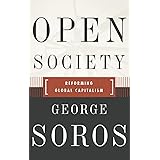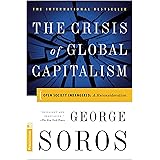Buy new:
-28% $15.93$15.93
Save with Used - Good
$7.11$7.11
Ships from: Amazon Sold by: Martistore





Download the free Kindle app and start reading Kindle books instantly on your smartphone, tablet, or computer - no Kindle device required.
Read instantly on your browser with Kindle for Web.
Using your mobile phone camera - scan the code below and download the Kindle app.

OK
 Audible sample Sample
Audible sample Sample 


The Bubble Of American Supremacy: Correcting The Misuse Of American Power Hardcover – December 15, 2003
Purchase options and add-ons
Soros believes that this administration's plans abroad come from the same sort of "bubble" psychology that afflicted our markets in the late 1990s. They have used a real fact, our overwhelming military supremacy, to create a deluded worldview, that might makes right and that "you're either with us or against us," in the same way that the recent boom used a real fact, the growth in technology, to lead to a delusion, the "new economy."
Like the best of the books that have responded quickly to world events, The Bubble of American Supremacy has a clear, intriguing, comprehensive thesis that makes necessary, and compelling, order of our seemingly disordered world.
- Print length224 pages
- LanguageEnglish
- PublisherPublicAffairs
- Publication dateDecember 15, 2003
- Dimensions5.5 x 0.75 x 7.75 inches
- ISBN-101586482173
- ISBN-13978-1586482176
The Amazon Book Review
Book recommendations, author interviews, editors' picks, and more. Read it now
Frequently bought together

Similar items that may deliver to you quickly
Editorial Reviews
Amazon.com Review
From Publishers Weekly
Copyright © Reed Business Information, a division of Reed Elsevier Inc. All rights reserved.
From Booklist
Alterman, the author of What Liberal Media? [BKL F 1 03], and Green, a New York City Democrat, offer a critique of both the president and his policies, with one of their main premises being that Bush starts with conclusions and then finds facts with which to frame them. So how does he make decisions? According to the authors, by asking what the religious right wants, what big business wants, and what the neocons want, and then proceeding accordingly. Chapters on the environment, business fraud, civil liberties, race, education, and, of course, foreign policy offer myriad examples of the authors' theories on how Bush misleads. It's all presented in highly readable fashion, but with the awakening economy and the passage of the Medicare bill, some of the information will seem out date. Those familiar with the anti-Bush canon will find this entry closest to David Corn's Lies of George W. Bush [BKL O 1 03], but Alterman has a higher profile and will make a bigger splash on the news shows.
Soros, who has made headlines for donating millions of dollars to stop the reelection of George Bush, is a man who puts his money where his mouth is. With the publication of this book, he may find that his words are also a potent weapon for realizing his goal. The founder of a fund-management group, Soros uses the metaphor of the economic bubble to show that the Bush administration's foreign policy is based on assumptions that are not only incorrect and deceptive but also will eventually burst. Step-by-step, he exposes a foreign policy that he believes contradicts American principles and has no hope of obtaining its goals of supremacy. He pulls no punches: "I contend that the Bush administration has deliberately exploited September 11 in order to pursue policies that the American public would not have otherwise tolerated." Soros offers historical perspective, social theory, and his own keen observational skills to make his points. This may be the one anti-Bush book that reaches an audience beyond the Democratic amen corner. Ilene Cooper
Copyright © American Library Association. All rights reserved
Review
About the Author
From The Washington Post
George Soros has a heart of gold and resources to match. At the London School of Economics, Karl Popper's vision of the "open society" came to underlie Soros's political thinking. Soros settled in the United States in 1956. His success as a financial speculator of genius included his legendary 1992 bet against the pound sterling, which netted him more than $1 billion in a few weeks. After he amassed a fortune estimated by Forbes magazine at $7 billion, he turned his attention to a unique philanthropic goal -- promoting open, decent, democratic society throughout the world -- an effort to which he has contributed nearly $5 billion. Wags described him as the only individual with his own foreign policy and suggested during the Clinton era that Soros does what the American government would do if it had the money. By itself, his imaginative role in undermining the Soviet Union and nudging the nascent democracies developing throughout its former empire would qualify him as a secular saint.
In The Bubble of American Supremacy, Soros's basic contention is that the Bush administration has deliberately and deceptively exploited the terrorist attacks of Sept. 11, 2001, in order to pursue radical policies "that the American public would not have otherwise tolerated." He views the Bush dream of American supremacy as unobtainable -- and a contradiction of America's traditional principles. Soros passionately believes that Bush's policy "endangers our values as well as our security." And because America is so powerful, he also argues, the Bush agenda also endangers the world.
Soros traces his sensitivity to the language of political extremism to his own background. "I grew up as a Jew in Hungary during World War II. I lived through both German and Soviet occupation and learned at an early age how political systems can affect your very survival. When I hear President Bush say that 'either you are with us or you are with the terrorists' I hear alarm bells." He has a similar reaction when John Ashcroft declares "to those who scare peace-loving people with phantoms of lost liberty, my message is this: Your tactics only aid terrorists." Soros declares, "this is not the America I chose as my home."
Even though such criticisms score many palpable but conventional hits on administration targets, Soros's positions are often muddled. He urges that the United States should have treated the Sept. 11 attacks not as acts of war but as crimes against humanity and that "crimes require police work, not military action." If language has meaning, this would have ruled out the American attack on Afghanistan. But at another point Soros writes, "the invasion of Afghanistan was justified by its role as the home base of al Qaeda."
Forced analogies do not help. In characterizing the drift of Bush policy-making away from America's normal ideological equilibrium in global diplomacy, Soros compares it to the stock market's boom-and-bust cycle. Use of terms -- such as "reflexivity," "radical fallibility," "the human uncertainty principle" and "fertile fallacies" -- that require an explanatory appendix also does not aid the cause of clarity.
Soros asserts as facts propositions that are debatable. Did the perpetrators behind Sept. 11 want the United States "to react the way we did"? Other "facts" are simply wrong. John Ashcroft has not "banned plea bargaining," as anyone recalling the fate of John Walker Lindh or following prosecution efforts in the Enron scandal would realize. At other times, Soros floats predictions that are almost certainly wrong -- for example, that the president's approval rating "is likely to sink as low as it had been high." Here Soros is stating that before the election Bush's approval rating will go lower than that of any previous president. Last month, Soros forecasted that the economy would hold at least through the elections. This makes his prediction about the president's popularity even more incomprehensible. All too often, Soros finds it sufficient to state his view without any sustained effort to support his position.
It is startling to read a man who considers himself something of a philosopher acknowledging that he was "not even aware of natural rights until I started studying" the neoconservative "view of the world." He believes that "Leo Strauss, who supposedly influenced Paul Wolfowitz and other neocons, cottoned on the first sentence of the declaration [of Independence] and derived, from the idea of self-evident truths the concept of natural rights," a concept that Soros believes "plays an important role in the ideology of American supremacists." He thinks that natural rights are "associated with conservative arguments and papal pronouncements" and that it is appropriate to distinguish between his concept of the open society and natural rights.
As the Columbia Encyclopedia states, "the classic expressions of natural rights are The English Bill of Rights (1689), the American Declaration of Independence (1776), the French Declaration of the Rights of Man and the Citizen (1789), the First 10 Amendments of the Constitution of the United States (known as the Bill of Rights, 1791), and the Universal Declaration of Human Rights of the United Nations (1948)." There is no opposition between the open society as expounded by Soros and the doctrine of natural rights.
Soros does not have either Henry Kissinger's talent for describing the complexities of the political world or Paul Krugman's ability to deploy relentless logic to skewer the Bush administration. Rather, his strength is in grasping the big picture, determining how he can make a difference, and succeeding in improving the world. He has pledged that "I shall do everything I can" to ensure that the president is defeated in this November's election. He has already contributed more than $12 million to that cause. Given Soros's track record, the president should be worried.
Reviewed by Daniel I. Davidson
Copyright 2004, The Washington Post Co. All Rights Reserved.
Product details
- Publisher : PublicAffairs; 1st edition (December 15, 2003)
- Language : English
- Hardcover : 224 pages
- ISBN-10 : 1586482173
- ISBN-13 : 978-1586482176
- Item Weight : 12 ounces
- Dimensions : 5.5 x 0.75 x 7.75 inches
- Best Sellers Rank: #603,415 in Books (See Top 100 in Books)
- #670 in National & International Security (Books)
- #3,006 in Political Science (Books)
- #15,282 in World History (Books)
- Customer Reviews:
About the author

George Soros is the chairman of Soros Fund Management and the founder the Open Societies Institute, a global network of foundations dedicated to supporting open societies. He is the author of several best-selling books including The New Paradigm for Financial Markets/The Crash of 2008 and What It Means, The Bubble of American Supremacy and The Age of Fallibility. He was born in Budapest and lives in New York City.
Customer reviews
Customer Reviews, including Product Star Ratings help customers to learn more about the product and decide whether it is the right product for them.
To calculate the overall star rating and percentage breakdown by star, we don’t use a simple average. Instead, our system considers things like how recent a review is and if the reviewer bought the item on Amazon. It also analyzed reviews to verify trustworthiness.
Learn more how customers reviews work on Amazon-
Top reviews
Top reviews from the United States
There was a problem filtering reviews right now. Please try again later.
Just as Mr. Soros has spent $500 Million a year for more than a decade trying to relieve suffering and increase opportunity any where in the world that needs it, he has also spent many hours writing a series of books that explain a clear way to look at future needs and the tools to develop the International Policies that will meet those needs.
I can't recommend this or any other of Mr. Soros efforts strongly enough, you'll never look at the world the same way again.
He calls his philosophy "radical fallibility." It is based on his mentor Karl Popper's belief that ultimate scientific truth remains permanently beyond our reach. Soros applies the same principal to social situations, concluding that we are always wrong, although the nature and extent of our error is variable. A corollary is the "fertile fallacy," which holds that an idea may be valid initially, but when expanded to cover larger areas become corrupted. An example of a fertile fallacy is the scientific method -- valid when applied to science, but leading to distortion and misunderstanding when applied to the social sciences. Soros states, without elaboration, that "my concept of fertile fallacy does not claim to be anything more than a fertile fallacy."
Soros' postulates lead him to his model of the "open society". The open society is one based on the conclusion that beliefs are provisionally true while keeping them open to constant reexamination. He states: "An open society holds itself open to improvement. It is based on the recognition that people have divergent views and interests and nobody is in possession of the ultimate truth." Freedom of thought, expression, and choice are essential to his open society. People living within the society decide the practical limitations on these freedoms.
Radical fallibility stands in dramatic contrast to the absolutes in the Declaration of Independence: "We hold these truths to be self evident, that all men are created equal (Justice); "that they are endowed by their creator with certain inalienable Rights, that among these are Life, Liberty, and the pursuit of Happiness" (Freedom); and, "That to secure these rights, Governments are instituted among Men, deriving their just powers from consent of the governed," (Self Government).
George Soros has become the new best friend of the Democratic Party, providing millions to fund surrogate organizations like MoveOn.Org. If his philosophy is shared by a majority of democrats, liberals, and progressives, and if most Republicans, conservatives, and libertarians hold to the traditional notions of democracy, then one must conclude that the schism in American society is greater than previously thought.
The first part of this book is a devastating critique of the imperialistic intent of the Bush administration. Soros constructs calmly and with measured deliberation a very sharp and very large pin, as it were, with which to burst the delusive bubble of what he calls the Bush doctrine of "American supremacy." He explains why it has failed in Iraq and why it will fail elsewhere. He avers:
"The United States cannot be either the police or the godparent of the world. America needs to work together with other countries." (p. 114)
I will not reprise his arguments here. Read them for yourself. To my mind they are utterly convincing. What I want to do instead is to present Soros's solution which is the subject of the second part of the book. His intent is to avoid a repetition of Bush's blunder in Iraq while at the same time protect the world from repressive and murderous regimes. What he has come up with is a shift in understanding of sovereignty from the sovereignty of governments to the sovereignty of people. He writes:
"The principle of sovereignty needs to be reconsidered. Sovereignty belongs to the people; the people are supposed to delegate it to the government through the electoral process." (p. 102)
He goes on to argue that the international community of states has the "responsibility to protect" the people from regimes intent on murder and mayhem. His intent is to justify intervention in the internal affairs of nations since he believes that what happens within a nation affects the world as a whole. Soros argues further that it would be a good idea to prevent crises before they develop. Instead of "the Bush doctrine of preemptive action of a military nature" he calls for "a doctrine of preventive action of a constructive nature." (p. 111)
Part of the impetus for Soros's argument comes from the Warsaw Declaration of 2000 in which it is proclaimed that "it is in the interest of all democratic countries...to foster the development of democracy in all other countries." (p. 112)
While Soros is a brilliant man of great visionary ability, I think it can be safely said that his doctrine is, considering the present state of international affairs, utopian. Nonetheless I think he is actually predicting what will happen in the future, although I don't think that such actions will be carried out by or under the auspices of the United Nations as it is presently constituted (and Soros says as much: see pp. 114-117). What Soros is envisioning is a coalition of democratic states led by the US and the European Union countries along with other economically and socially advanced countries deciding at some point that it is in their best interests to put the dictators and failed regimes out of business and to support and nurture democratic ones. If this works then the entire world might be constituted of nation states who solve their differences without recourse to the use of military force. At such time a new United Nations will be formed with a more equitable distribution of power among its members as well as greater authority and the real ability to enforce its regulations. Such a United Nations would be something similar to a United States of the World.
As interesting sidebar to Soros's argument is the idea that it is the very process of globalization that leads to the need to intervene in the internal affairs of nations. It is because of the international exchange of goods and services and the globalization of capital that the interests of one nation are affected by the actions of another. The resources of any one nation are themselves international. It used to be, as Soros points out, that most of the economic activity of any given state was internal. Now we have our wealth all over the globe. Consequently we must have the institutions that protect our interests and ensure the "maintenance of the market mechanism itself" all over the globe.
Should there be any doubt about the revolutionary nature of Soros's new world order, consider this from page 142: "The natural resources of a country ought to belong to the people, but the rulers often exploit the resources for their own personal needs. This violates the sovereignty of the people and calls for external intervention."
Consider this as well: "...the United States cannot avoid intervening in the internal affairs of other countries, but I claim that we must do so only on legitimate grounds." He quickly adds, so that there can be no mistake: "The Bush doctrine cannot be accepted by the rest of the world as legitimate." (pp. 171-172)
I highly recommend that readers read the Appendix entitled "My Conceptual Framework." In it Soros presents his ideas about "reflexivity," "radical fallibility," "the open society," and "the human uncertainty principle." Here's a sample of the profound understanding that this brilliant man has come to over the course of his extraordinary life: "We must treat our beliefs as provisionally true while keeping them open to constant reexamination. This is the foundation principle of an open society." (p. 195)
This principle, I must note, is allied to the idea of the invisible hand of the free market in which the intelligence of uncounted participants is reflected. There is a cognate in the ideas that are coming out of complexity theory in which we learn that intelligence is not a top down phenomenon, but something that can be brought about by autonomous individuals acting cooperatively like the neurons of our brains or ants in a colony or bees in a hive. But if individuals are not free to express themselves, but are oppressed by authority, their wisdom will never reach coalescence.



















